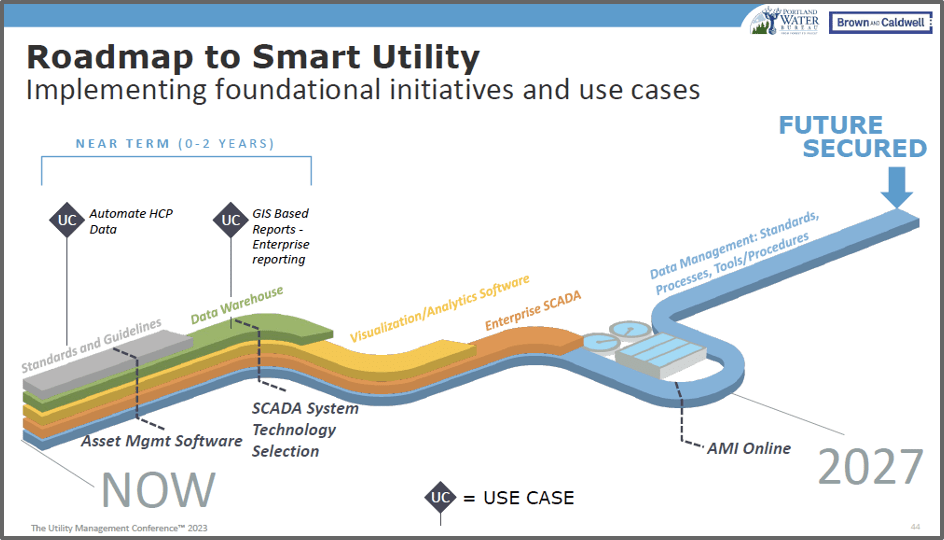A mainstay in our annual event schedule, Bluefield Research keenly participated in the AWWA’s Utility Management Conference in Sacramento, California, this past 28–30 March. Well attended by a vast array of city water and wastewater officials and their engineering firm partners, it offered a window into current thinking on recurring challenges.
The same multifaceted set of challenges is always there—aging infrastructure, resource unpredictability, staffing shortages, inflation woes, rate-setting inflexibility, increasing regulatory requirements, and the need for digitalization. So, against this very complex backdrop that changes slowly and incrementally, what’s new?
- A banking crisis and catastrophic recession are NOT of concern. One might think that just up the road from Silicon Valley Bank, there would be discussion of a banking crisis that could have a ripple effect on the water sector. Not so. As a sector reliant on a rate base for essential services, with an influx of federal funding via IIJA, no one seemed particularly concerned about a 2008-level banking sector crisis. Yes, there will be major, across-the-board tech layoffs (e.g., Amazon), but these firms diverge from water’s fundamentally sound business case.
- PFAS (per- and polyfluoroalkyl substances) regulations are a clear and present challenge. Multiple sessions addressed both new regulations limiting the maximum concentration levels of perfluoroalkyl compounds and the elephant in the room: PFAS removal from biosolids. Engineering firms presented plant designs and project completions that did not factor in PFAS, which suggests that we are still in the early stages of addressing these challenges that will require billions in investment to mitigate.
- Asset management takes center stage. Often considered a lesser accessory to planning departments, asset management is coming to the forefront as a key tool for both operations and longer-term planning. The increased deployment of devices that capture asset data—and the advent of artificial intelligence to mine it—provides powerful decision-support tools and insights to asset managers. Tuesday’s workshops held by Brown and Caldwell and Arcadis highlighted the possibilities of advanced asset management rooted in the realities of day-to-day operations. Based on comments from large and small operators, the trick is to manage the ‘people’ aspect to get buy-in on new workflows for decision making.
- Chronic staffing shortages remain a massive hurdle. Buy-in on anything remains challenging with a dearth of qualified candidates across the board for many positions—from certified treatment plant operators to software developers; was echoed throughout the conference. The water industry is not competitive with other sectors for many skill sets and must either restructure organizationally or find even more creative ways to attract talent. Engineering firms benefit, to some extent, from city utilities’ inability to hire internally as they are more prone to outsource—but this is not a long-term solution.
- Digitalization is not a strategy; it’s a strategy enabler. Utilities’ presentation of their digital initiatives underscored the importance of an underlying strategy behind adoption. For example, the Portland Water Bureau’s roadmap includes a discrete set of steps using specific software and hardware to achieve specific operational goals, which clarifies the importance of up-front planning to adoption. This planning process is difficult and tests the organizational structure of highly siloed utility departments, but it is vital to successfully implement new technologies.

Source: Portland Water Bureau
- Cybersecurity will become embedded into utility health. Bluefield recently published a white paper with Amazon Web Services evaluating the cybersecurity vulnerabilities and solutions resulting from increased digitalization. Providing highlights in our presentation at the conference, utility audience members were still processing the implications of the EPA’s recent guidance that will include cybersecurity audits alongside sanitary survey completion. An IT cultural shift is underway in many cities as they become more reliant on cloud services and overcome their fears of hacked SCADA systems or ransomed billing platforms.
These takeaways—on the heels of a UN water conference in New York and following massive rainstorms and snowstorms from California’s atmospheric rivers—signify that change is afoot in the water sector to address these recurring challenges. Bluefield Research looks forward to informing all stakeholders with market insights to steer their decision making.

